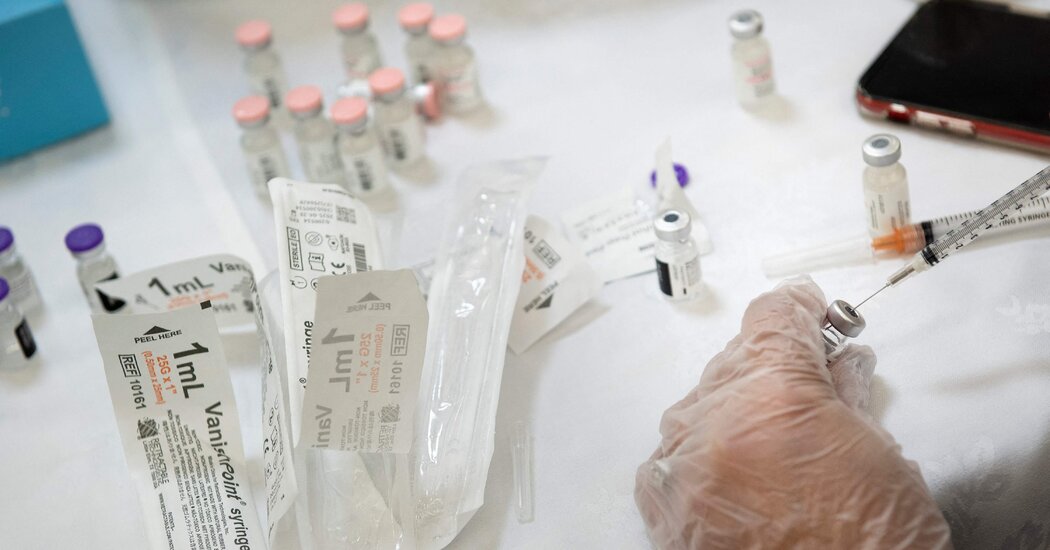
Two of the Food and Drug Administration’s top vaccine regulators will leave the agency this fall, a development that could disrupt the F.D.A.’s work on deciding whether to recommend coronavirus vaccines for children under 12 and booster shots for the general population.
Dr. Marion Gruber, the director of the F.D.A.’s vaccines office, will retire at the end of October, and her deputy, Dr. Philip Krause, will leave in November, according to an email that Dr. Peter Marks, the agency’s top vaccine regulator, sent to staff members on Tuesday. One reason for their departure was that Dr. Gruber and Dr. Krause were upset about the Biden administration’s recent announcement that American adults should get a coronavirus booster vaccination eight months after they received their second shot, according to people familiar with their thinking.
Neither believed there was enough data to defend such a decision, the people said, and both viewed the announcement, amplified by President Biden, as applying pressure on the F.D.A., the people said.
Dr. Marks said that he would serve as the acting director of the vaccines office while the agency searched for its next leader. Stephanie Caccomo, a spokeswoman for the agency, said it was “confident in the expertise and ability of our staff to continue our critical public health work.”
Some public health experts have said the administration’s booster shot announcement, which included a caveat that the F.D.A. would first have to clear such shots, pre-empted the agency and undermined its responsibility to make that assessment on its own, led by career scientists.
Some have also challenged the plan for booster shots as premature, saying the available data shows that the Pfizer-BioNTech and Moderna vaccines are holding up well against severe disease and hospitalization, including against the Delta variant. Extra shots would be warranted only if the vaccines failed to meet that standard, some have said.
White House officials have stressed that the plan for Americans to start receiving boosters next month was uniformly endorsed by the most senior federal health officials, including Dr. Janet Woodcock, the acting F.D.A. commissioner. And they have described the need to develop a booster plan as urgent in light of growing evidence that the vaccines lose potency against infection over time — a trend that they fear suggests their protection against severe disease and hospitalization could also soon weaken.
The officials have specifically cited data from Israel, which vaccinated more of its population earlier than the United States, as a particularly worrisome sign of what could lie ahead. Data from other countries “actually has led us to be even more concerned about increased risk of vaccine effectiveness waning against hospitalization, severe disease and death,” Dr. Rochelle P. Walensky, the director of the Centers for Disease Control and Prevention, said at a White House briefing on the pandemic on Tuesday.
Asked about reports that Dr. Gruber and Dr. Krause were unhappy with pressure on the agency, Jeffrey D. Zients, the White House’s Covid-19 response coordinator, reiterated that the booster strategy is contingent on F.D.A. review.
“As our medical experts laid out, having reviewed all the available data, it is in their clinical judgment that it is time to prepare Americans for a booster shot,” he said at the briefing. “We announced our approach in order to stay ahead of the virus, give states and pharmacies time to plan and to be transparent with the American people.”
But some critics have said that explanation falls short because career F.D.A. regulators are now trying to determine whether booster shots are safe and effective after the White House — and their own agency head, Dr. Woodcock — have already endorsed administering them.
“This process has been the reverse of what we would normally expect in vaccine policy,” with the administration announcing plans based on a certain outcome before regulators can complete their review, said Jason L. Schwartz, associate professor of health policy at the Yale School of Public Health. “That has made it even more complicated and confusing for the public.”

